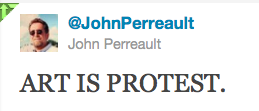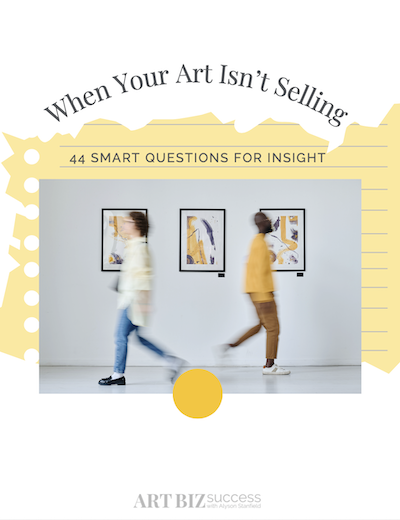I’m always on the lookout for topics for Deep Thought Thursday, so I love it when a gift appears in front of me – like this tweet that showed up in my Twitter stream yesterday from one of my favorite art-thinkers/writers/critics.
ART IS PROTEST.
– John Perreault
What do you think?




17 thoughts on “Art is Protest < Deep Thought Thursday”
Sometimes, but not always. The art I create from litter for Museum of Litter, definitely is protest. It’s about changing the consciousness about littering. But my other art tends to be about celebrating beauty and inspiration. I still like art to be pleasing to the eye — even the pieces made from litter.
I too, want to make the world a better place with my art – by creating beauty and order from chaos. I protest against the idea that “art” has to be ugly in order to be called “ART.”
Protest: “A statement or action expressing disapproval of or objection to something.”
I see the action of making art as a protest/choice i.e. I will make art right now rather than watching TV or gossiping on the phone or texting or surfing the web or burglarizing or getting high or complaining about the world, etc. In that sense making art is a protest, I protest these other actions by not doing them.
And I see my life as a full-time artist as a protest against the “do-what-you-are told and you will be safe and secure” world. It is not always comfortable, it has required a lot of paring away…and I love it.
One of my favorites of Steve Jobs’ famous quotes:
“Your work is going to fill a large part of your life, and the only way to be truly satisfied is to do what you believe is great work. And the only way to do great work is to love what you do. If you haven’t found it yet, keep looking. Don’t settle.”
For me, this has meant a lot of protest against the status quo, inner and outer.
Listening to CBC radio the other day I caught a snip of an interview (therefore do not know who the interviewee was) just in time to hear him explain a quote of his that went something like this: to revolt is to create, to create is to revolt (he might have used the word rebel). He explained that when you rebel against something you have to first do it with a negative, a “no” response, and to rebel positively you have to create a solution or other response; conversely if you are creating a solution or response you have first responded with a “no”. I don’t believe something has to be ugly or damaging or wrong in any way to be able to illicit a “no” response. But to go beyond a “no” response (a form of protest) I agree that one must get creative.
Col Mitchell: the speaker was Stephane Hessel, former French Resistance fighter and diplomat.
Thank you Alyson!
This statement implies that all art is protest, and thus it would follow that “all artists are protestors”, which is a huge generalization. If I choose to have a salad for lunch, I am not necessarily protesting the consumption of meat. In the same manner, my choice of subject manner for my art is not a protest against another type of subject matter.
Certainly there are countless artists throughout history who have ‘protested’ against war, politics, various injustices and even against other art movements (think Goya, Picasso, Jackson Pollock to name a few). In the end, unless the protest is visible, understood, and results in constructive change(s), what purpose has it served? Jan Sterbak/Lady Gaga’s Meat Dress protest was so effective that it was seen and heard of on a world wide scale. The message of the art, overshadowed by the resultant public outcry against the artist’s shock tactics, was completely lost in the furor. I doubt if many people’s opinions about anything were swayed by this protest, except that art that shocks is not art.
It is the message in the art that is important. That message could be about protest after all, or it could be about beauty, ugliness or anything inbetween.
Beauty or litter, it’s all about challenging people to see anew, to drop their blinkers and perceive the world in way other than their everyday perception. Not “protest” in the Occupy Wall Street sense, but protest, nevertheless.
I disagree with the absolute statement. Art *can* be protest, Picasso’s “Guernica” (http://www.pablopicasso.org/guernica.jsp) is probably the most obvious example. Art is also depiction or acceptance or reflection. Monet’s “London” series (http://www.artic.edu/artexplorer/search.php?tab=2&resource=383) is reflective. Art is even sometimes bombastic or silly. I take duChamp’s “Fountain” (https://secure.wikimedia.org/wikipedia/en/wiki/Fountain_%28Duchamp%29) to be of the silly sort, though it is said he intended it to be of the protest sort.
It seems to me, that when art *is* protest, the artist must be very careful to not overstep the line into propaganda. In Picasso’s case, he trod very close to the line, but — I think — artfully stayed with ‘mere’ protest.
“Here is what I think and feel about this” is the voice of art. “Here’s what you should think and feel” is the command of propaganda.
Art is only protest is pervert the meaning of protest or pervert the meaning of art. My take is that it is a silly comment meant only to be provocative and cheapens art. People who say such things make me angry because they dilute language in general and art in particular. There is no depth in such a statement, only ego.
I disagree that there “is no depth in such a statement, only ego.” Seeing this statement caused me to stop and ponder its meaning. My initial reaction was that of the first comment: sometimes, but not always. But as I thought more about it and read other comments, I thought maybe art could always be considered a form of protest, esp. given its status in US culture–a protest against (or for) a wide variety of ideas and norms and schools of thought (even within art). If you go to the author’s twitter feed, he has posted a series of these pronouncements about ART in capital letters–some more profound than others. But what is wrong with provocative comments about art if it spurs meaningful conversation about art?
I agree with the thought that art can be used as a method of protest, but it can also express other ideas.
Despite my lack of ‘twitt-ability’, i clicked on the link to see what else Perrault had to say on the subject. In view of his stream of “Art is …” statements, I think I have to agree with Russell on this one.
Can I reply to myself? Having just visited his website, I have a greater appreciation for where he might be coming from. Having a conversation based on such a tiny snippet is one of the weaknesses of internet instant accessibility. Having said that, having that accessibility allowed me to investigate further. Maybe that’s the point here…
It seems to me that – although there are tons of Americans who value the handmade, the creative, the one-of-a-kind – most folks go for cheaply-made and mass-produced items, food, etc. When an artist creates an original piece of art, he or she is choosing to go against this tide. In that sense, I do think that (all) art is protest, at least in our society.
Propaganda is not art.
Personally I feel that “Art is Passion” is the better sweeping generalization.
It can be positive or negative. I try to inspire and be inspired myself and avoid shock art.. because I get plenty shocked outside of art (hardly feel complacent or sheltered). I’m rebelling against all those who told me I couldn’t do ____[fill in the blank]___ by trying my damnedest to.. but the notion that everything has got to be controversial and challenge the establishment is a little too narrow minded for me. 😉